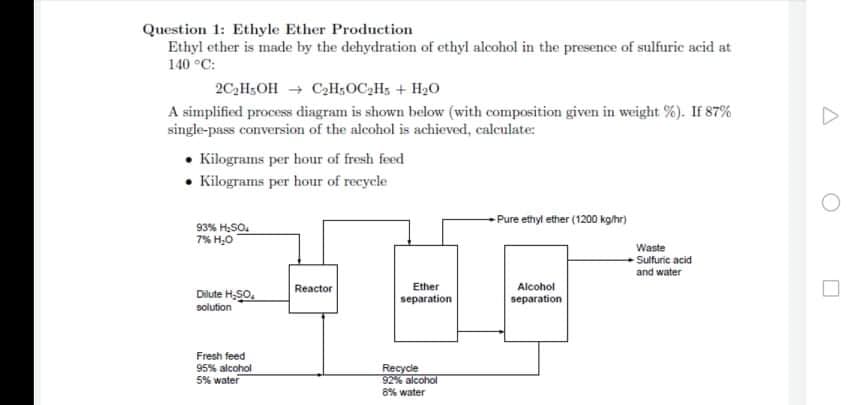Question 1: Ethyle Ether Production Ethyl ether is made by the dehydration of ethyl alcohol in the presence of sulfuric acid at 140 °C: 2C2H;OH + C2H;OC;Hs + H20 A simplified process diagram is shown below (with composition given in weight %). If 87% single-pass conversion of the alcohol is achieved, calculate: • Kilograms per hour of fresh feed • Kilograms per hour of recycle - Pure ethyl ether (1200 kghr) 93% H,SO. 7% H,0 Waste Sulturic acid and water Reactor Ether separation Alcohol Dilute H,SO, solution separation Fresh feed 95% alcohol 5% water Recycle 92% alcohol 6% water
Question 1: Ethyle Ether Production Ethyl ether is made by the dehydration of ethyl alcohol in the presence of sulfuric acid at 140 °C: 2C2H;OH + C2H;OC;Hs + H20 A simplified process diagram is shown below (with composition given in weight %). If 87% single-pass conversion of the alcohol is achieved, calculate: • Kilograms per hour of fresh feed • Kilograms per hour of recycle - Pure ethyl ether (1200 kghr) 93% H,SO. 7% H,0 Waste Sulturic acid and water Reactor Ether separation Alcohol Dilute H,SO, solution separation Fresh feed 95% alcohol 5% water Recycle 92% alcohol 6% water
Introduction to Chemical Engineering Thermodynamics
8th Edition
ISBN:9781259696527
Author:J.M. Smith Termodinamica en ingenieria quimica, Hendrick C Van Ness, Michael Abbott, Mark Swihart
Publisher:J.M. Smith Termodinamica en ingenieria quimica, Hendrick C Van Ness, Michael Abbott, Mark Swihart
Chapter1: Introduction
Section: Chapter Questions
Problem 1.1P
Related questions
Question

Transcribed Image Text:Question 1: Ethyle Ether Production
Ethyl ether is made by the dehydration of ethyl alcohol in the presence of sulfuric acid at
140 °C:
2C2H;OH + C2H;OC;Hs + H20
A simplified process diagram is shown below (with composition given in weight %). If 87%
single-pass conversion of the alcohol is achieved, calculate:
• Kilograms per hour of fresh feed
• Kilograms per hour of recycle
- Pure ethyl ether (1200 kghr)
93% H,SO.
7% H,0
Waste
Sulturic acid
and water
Reactor
Ether
separation
Alcohol
Dilute H,SO,
solution
separation
Fresh feed
95% alcohol
5% water
Recycle
92% alcohol
6% water
Expert Solution
This question has been solved!
Explore an expertly crafted, step-by-step solution for a thorough understanding of key concepts.
This is a popular solution!
Trending now
This is a popular solution!
Step by step
Solved in 6 steps

Knowledge Booster
Learn more about
Need a deep-dive on the concept behind this application? Look no further. Learn more about this topic, chemical-engineering and related others by exploring similar questions and additional content below.Recommended textbooks for you

Introduction to Chemical Engineering Thermodynami…
Chemical Engineering
ISBN:
9781259696527
Author:
J.M. Smith Termodinamica en ingenieria quimica, Hendrick C Van Ness, Michael Abbott, Mark Swihart
Publisher:
McGraw-Hill Education

Elementary Principles of Chemical Processes, Bind…
Chemical Engineering
ISBN:
9781118431221
Author:
Richard M. Felder, Ronald W. Rousseau, Lisa G. Bullard
Publisher:
WILEY

Elements of Chemical Reaction Engineering (5th Ed…
Chemical Engineering
ISBN:
9780133887518
Author:
H. Scott Fogler
Publisher:
Prentice Hall

Introduction to Chemical Engineering Thermodynami…
Chemical Engineering
ISBN:
9781259696527
Author:
J.M. Smith Termodinamica en ingenieria quimica, Hendrick C Van Ness, Michael Abbott, Mark Swihart
Publisher:
McGraw-Hill Education

Elementary Principles of Chemical Processes, Bind…
Chemical Engineering
ISBN:
9781118431221
Author:
Richard M. Felder, Ronald W. Rousseau, Lisa G. Bullard
Publisher:
WILEY

Elements of Chemical Reaction Engineering (5th Ed…
Chemical Engineering
ISBN:
9780133887518
Author:
H. Scott Fogler
Publisher:
Prentice Hall


Industrial Plastics: Theory and Applications
Chemical Engineering
ISBN:
9781285061238
Author:
Lokensgard, Erik
Publisher:
Delmar Cengage Learning

Unit Operations of Chemical Engineering
Chemical Engineering
ISBN:
9780072848236
Author:
Warren McCabe, Julian C. Smith, Peter Harriott
Publisher:
McGraw-Hill Companies, The